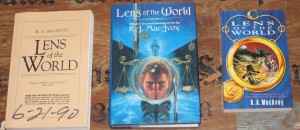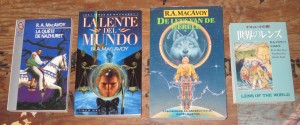

I’ve read that everyone’s first novel is a sort of autobiography. Perhaps that is true, but have no memory of the first novel I wrote, as the first I published was perhaps number ten. But LENS is the closest thing to autobiography I ever wrote. There is no single fact in the book that reflects a single fact of my life, but still, it is so.
I identify strongly with Nazhuret. I’ve never identified with one of my own protagonists before or since, but there it is. Was. I did make a great mistake, however, in using what is called the ‘unreliable narrator’ technique. That simply means that in a first-person narrative – and these are the only first person narratives I’ve ever done – you need not believe what the narrator says is the truth. Especially when the narrator is speaking about himself.
It seemed to me obvious that no one has an objective idea of what they look like. When we speak to a friend, we assume that. In fact, it is often humorous the difference between what someone says about themselves against what we ourselves are seeing when we look at them. So when I had Nazhuret describe himself as a hideous dwarfish being, I assumed all would know they were listening to a man with a poor self image. And all the other major characters in the book do not react to him as though he were in any sense misshapen. He is only a cross-bred man of two ethnic groups that don’t like each other and don’t often, therefore, well, cross-breed.
The cover artists certainly didn’t understand that. Nor the reviewers. Not that I got bad reviews on the book. Except to say I was bold enough to have a truly ugly protagonist.
I’m not actually that bold. In fact, Nazhuret was supposed to look a bit like myself. That’s what hurt.
I think another difficulty was in the fact that contemporary first-person narrative really is rarely first-person. It is third-person semi-omniscient using the word ‘I’ instead of ‘he’ or ‘she’. In fact, it goes to the extreme where a first-person can end the novel by saying something to the effect of ‘and then I died.’ Or ‘then all went black.’ When that happens I want to burst out at the book “Then who on earth is talking to us? Who is telling the entire story, and to whom is he telling it?”
With that in mind I made this series of three books in the very first form of the novel: the epistolary form. That means it is a series of letters, from one person to another. My agent advised me strongly not to do this. It would lose audience, he said, and perhaps he was right. But given the technological period in which I set it, I didn’t see how I could avoid the form and still be true to the characters.
I know it was hard slogging for the reader. I tried to minimize this and keep it entertaining, but I know it was hard slogging and I’m grateful to all who were canny enough to keep up.
The other hidden aspect of Lens is that it isn’t in the slightest bit fantasy. It is a story of the history of science and technology in a different, but not too different, world. Somehow that slipped by people.
Everyone has a favorite child, although it’s best if the child never finds out. LENS is mine.

You mentioned reading these books slowly. I did. I have listened first and then followed by re-reading the books in the Kindle version (because of my arthritic thumbs). I had not noticed until well into the second book that I had been hearing the books at .75% speed. It gave the books a thoughtful, meditative pace appropriate to our hero’s reflective story telling. I recommend the Audible versions at this reduced speed. I was surprised by the ending for Nazhuret. It did not seem to me that the Count was a sufficiently interesting man to hold Nazhuret’s attention for ten years until his death.